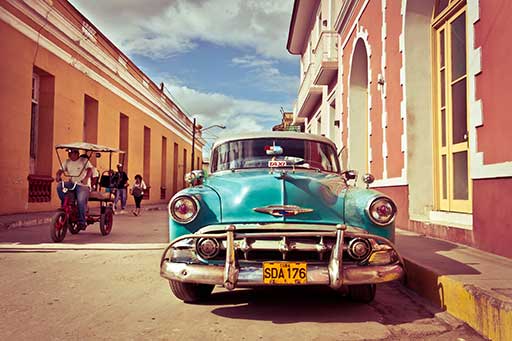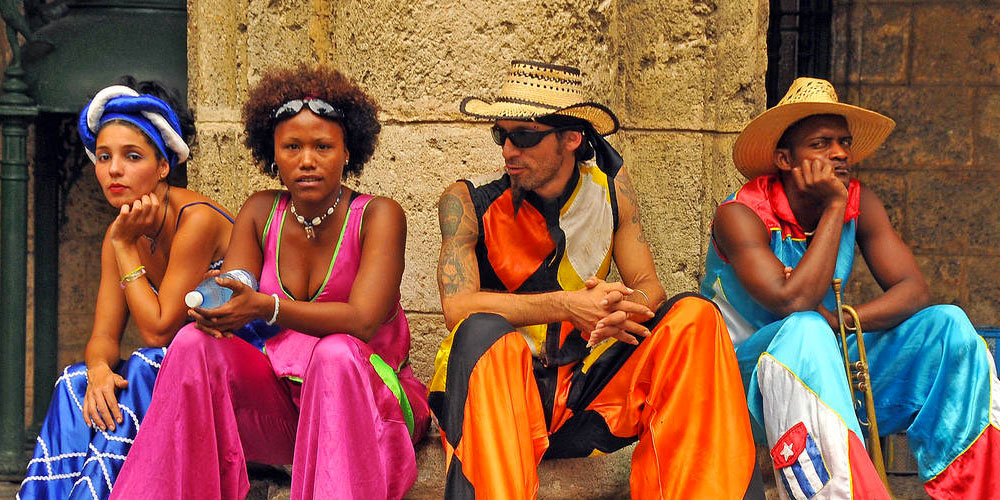Colorful Cuban Expressions
On July 20th 2015, the United States and Cuba restarted diplomatic relations after a hiatus that lasted for over 50 years. As a result,
Americans will be able to travel to Cuba and vice versa.
We are thrilled that many years of strained relations have been replaced by a new opportunity for collaboration between the two countries
and we want to celebrate it. Our contribution to this historical change
is about language. Getting closer to Cuba is also learning their language and culture.
This article contains many examples of Spanish slang and expressions specific to the Island nation of Cuba.
Travelling
Imagine you arrive at Cuba for the first time and you want to go sightseeing La Havana. The first thing you will need to know is how
public transport is called. Well, the people from Cuba have very special names for it:
Guagua - While in other countries guagua means 'kid', in Cuba it stands for 'bus'. So, take a guagua to the beach!
Almendrón - This is the name for old cars, those which were produced before 1960, the year the U.S. embargo started. In fact,
an almendrón can be 90 years old! Many of these cars are used as private taxis, so you may take one if you visit the island.
Camello - Due to the economical crisis in 1990, a peculiar public transport was born: the camello, a huge bus which is carried by
a truck. It was such a big bus that more than 300 people could travel on it. They are no longer working, but they were so important for
Cubans that it’s worth knowing about them.
Cocotero - This is how Cubans call a very particular motorcycle taxi which is widely used in La Havana and other major cities.
Parar botella - If you are backpacking and travelling around Cuba, and you feel like hitch-hiking, you should know that the name
for it is parar botella.

Meeting new friends
Acere, consorte, monina and bróder - These are all synonyms. They stand for 'buddy', 'dude' and 'brother'.
Que volá or qué bolá - It’s a local greeting, a friendly way of saying 'how are you doing?', it can be translated as 'what’s up'.
Then, ¿Qué volá, acere? is something like 'What’s up, dude?'.
Alabao - It’s a very singular local expression, a bit difficult to translate. It may be an expression of surprise like ¡Alabao,
eso es genial!, which could be translated as 'Wow, that’s great!'. Or, it can also be a greeting, the equivalent of congratulations.
Parranda - It’s usually used in the phrase irse de parranda, is to say, 'going out on the town'. But the party mood during a
parranda may last the whole night or even three days or more. The closest English word for parranda is 'binge'.
Descarguita - There is no translation for descarguita. People in Cuba often gathers after work to play the guitar and sing for a while.
It’s their 'after-office'. They may do it at a bar, at home or even at the street. They call this a descarguita.
Candela - This is a very versatile word. It may have different meanings depending on the context and region. But generally it’s
used in the phrase dar candela, which stands for 'beat up'.
Comemierda - It’s a very common insult, something like 'idiot' or 'asshole'. If someone tells you comemierda, he/she is definitely
mad at you. Consider saying sorry.
Packing bags back home
If you are packing your bag back home from Cuba, you may like to know how pieces of clothes are called. Remember that blúmer is the
Cuban word for 'panties', saya stands for 'skirt', pitusa is 'jeans' and popis are 'trainers'. And also… don’t forget
your espejuelos at your night table! (those would be your glasses).
At VidaLingua we see our mission as something greater than helping people learn languages and meeting people from other cultures. We think
language can play an important role in improving understanding between people and new technologies like apps can be a catalysts for
friendships across borders. Increasing understanding and friendship results in a more stable world, and that’s something worth investing in.
That’s the reason we’ve been busy adding words and expressions from Cuba and the US to
Spanish English Dictionary + and
PhraseMates. Check out these and many more Cuban words at our apps.

Victoria Sfriso
Lead Spanish Linguist
VidaLingua
